Raj Vinnakota Delivers Keynote Speech at Gettysburg College
August 27, 2024
Share
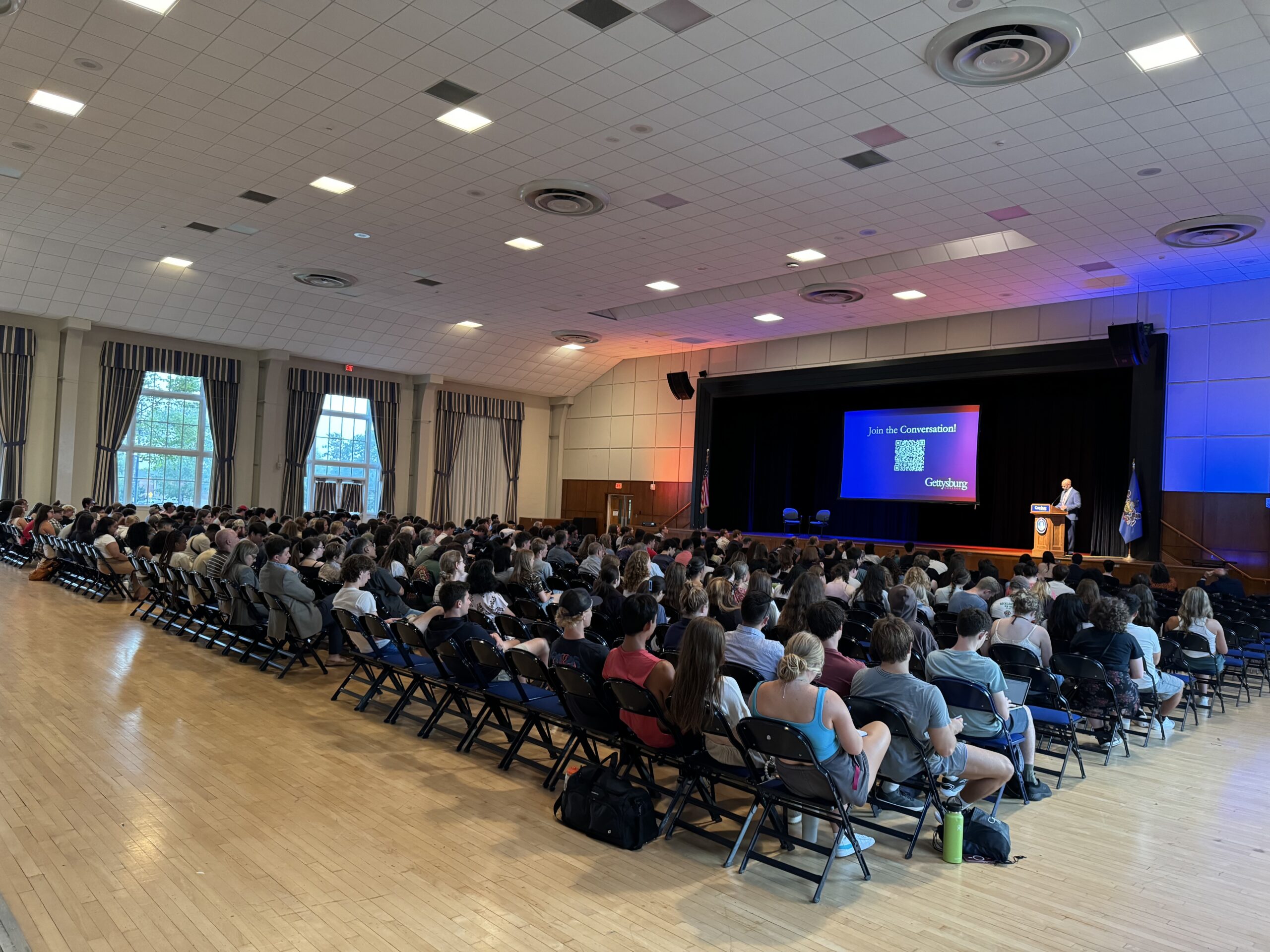
Gettysburg College, a member institution of College Presidents for Civic Preparedness, launched its year-long “Conversations for Change” initiative this fall. Raj Vinnakota, President of Citizens & Scholars, served as the keynote speaker for the initiative’s kickoff. He addressed an audience of over 700 first-year students, emphasizing how civil discourse is essential for a healthy democracy and a crucial skill for success in campus life, the workplace, and our communities. Following his speech, there was a civil discourse exercise involving Raj and the leaders of both the Gettysburg College Republicans and Democrats. The event concluded with a moderated Q&A session with the students.
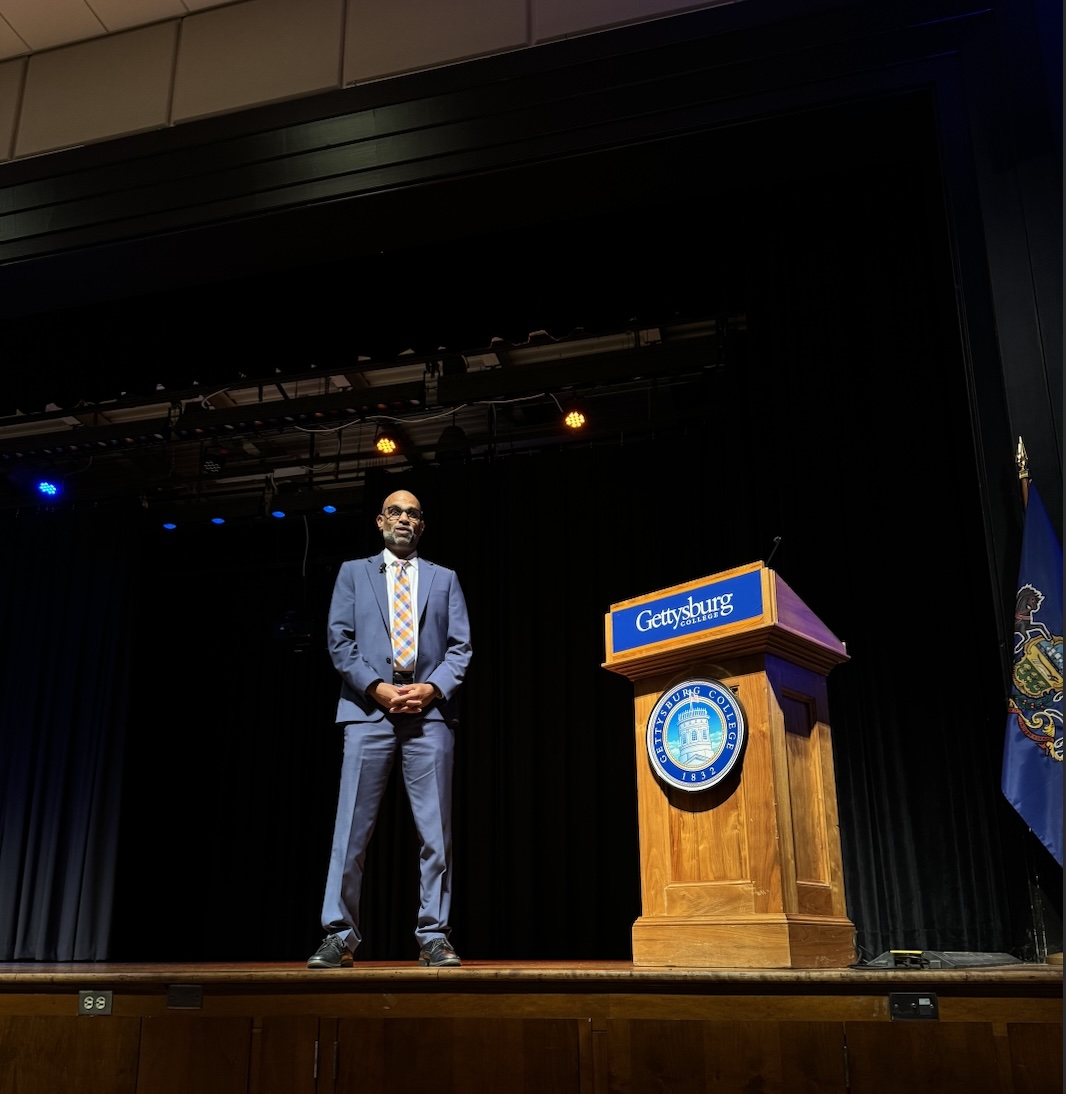
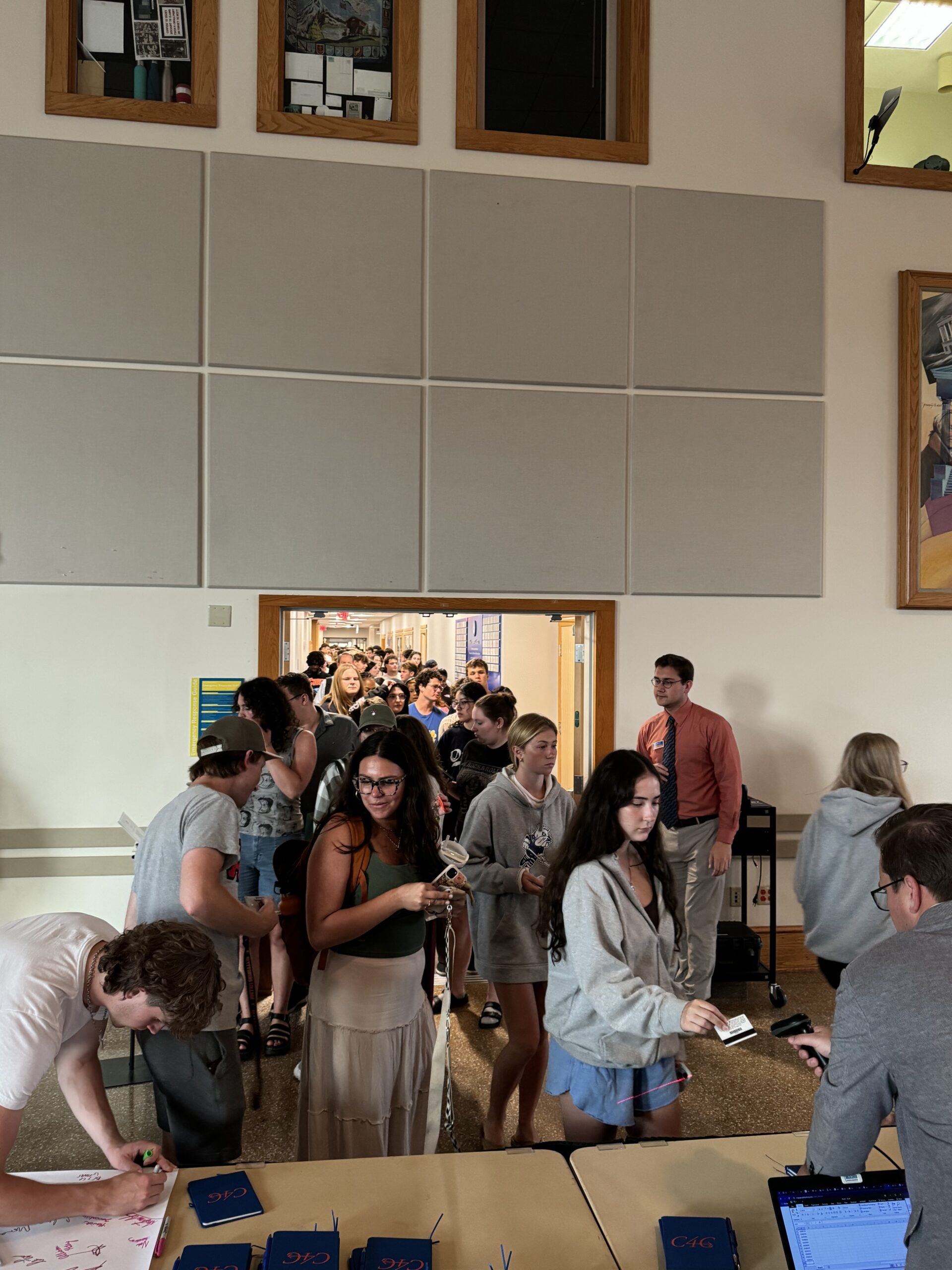
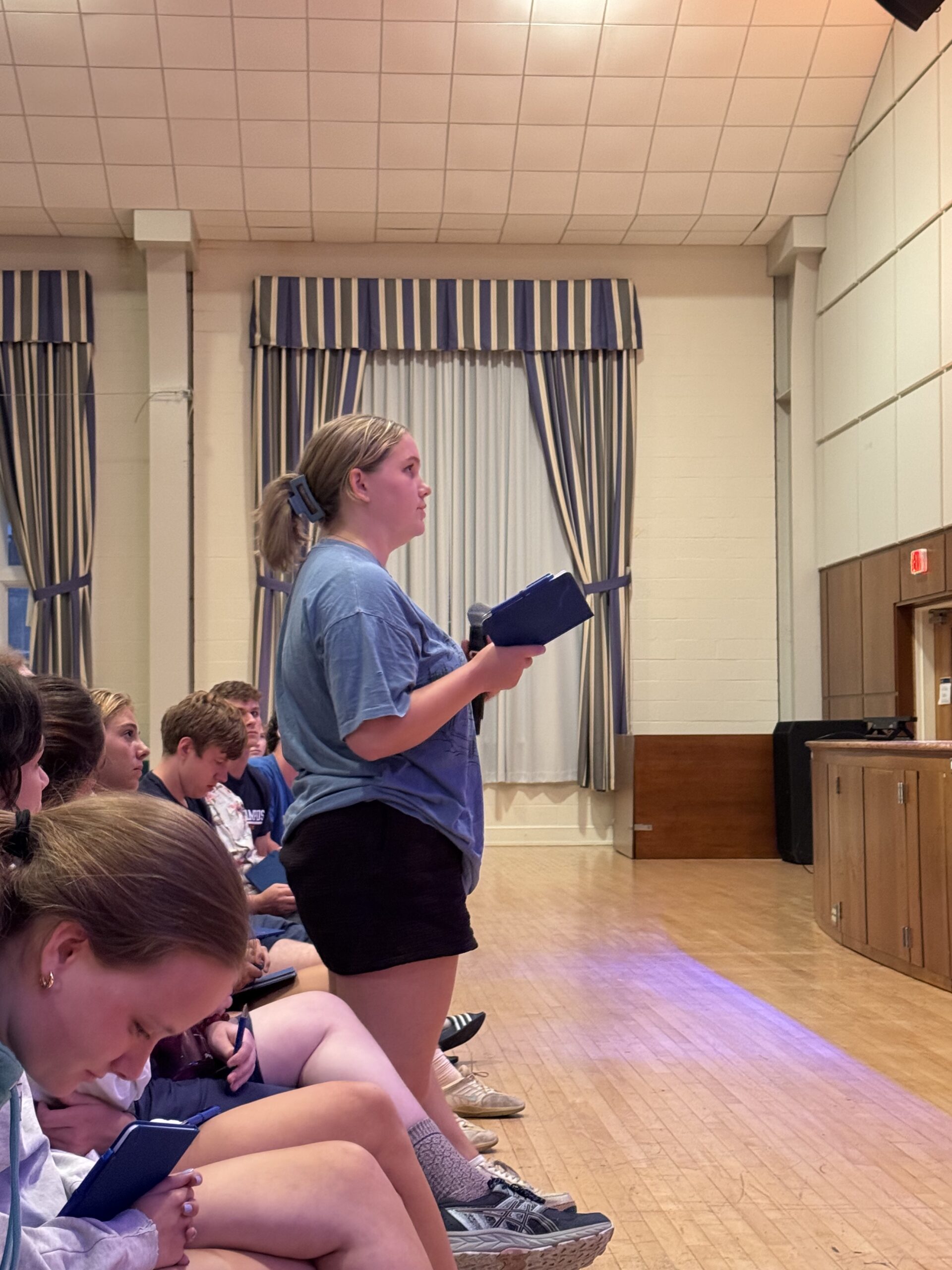
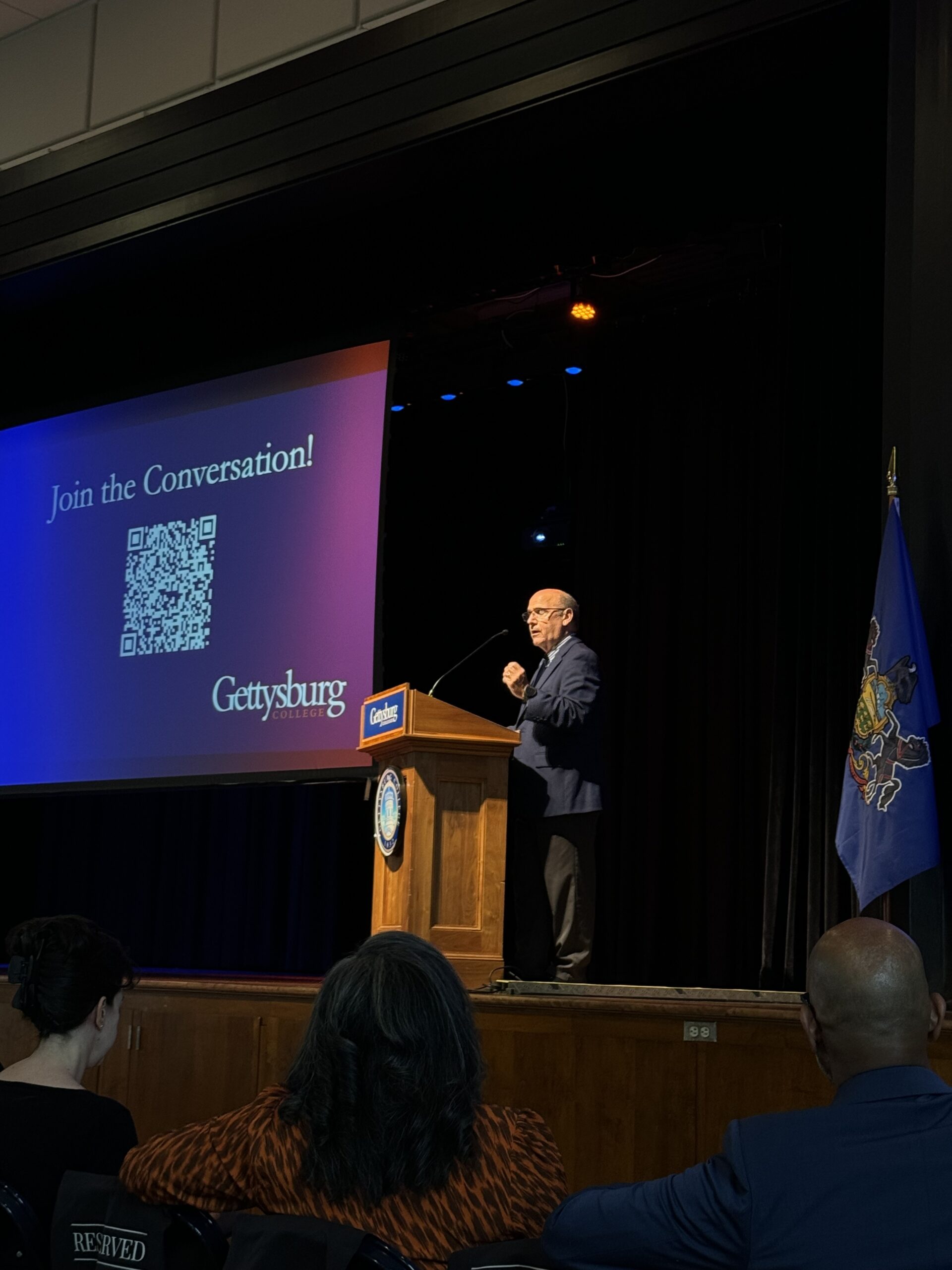
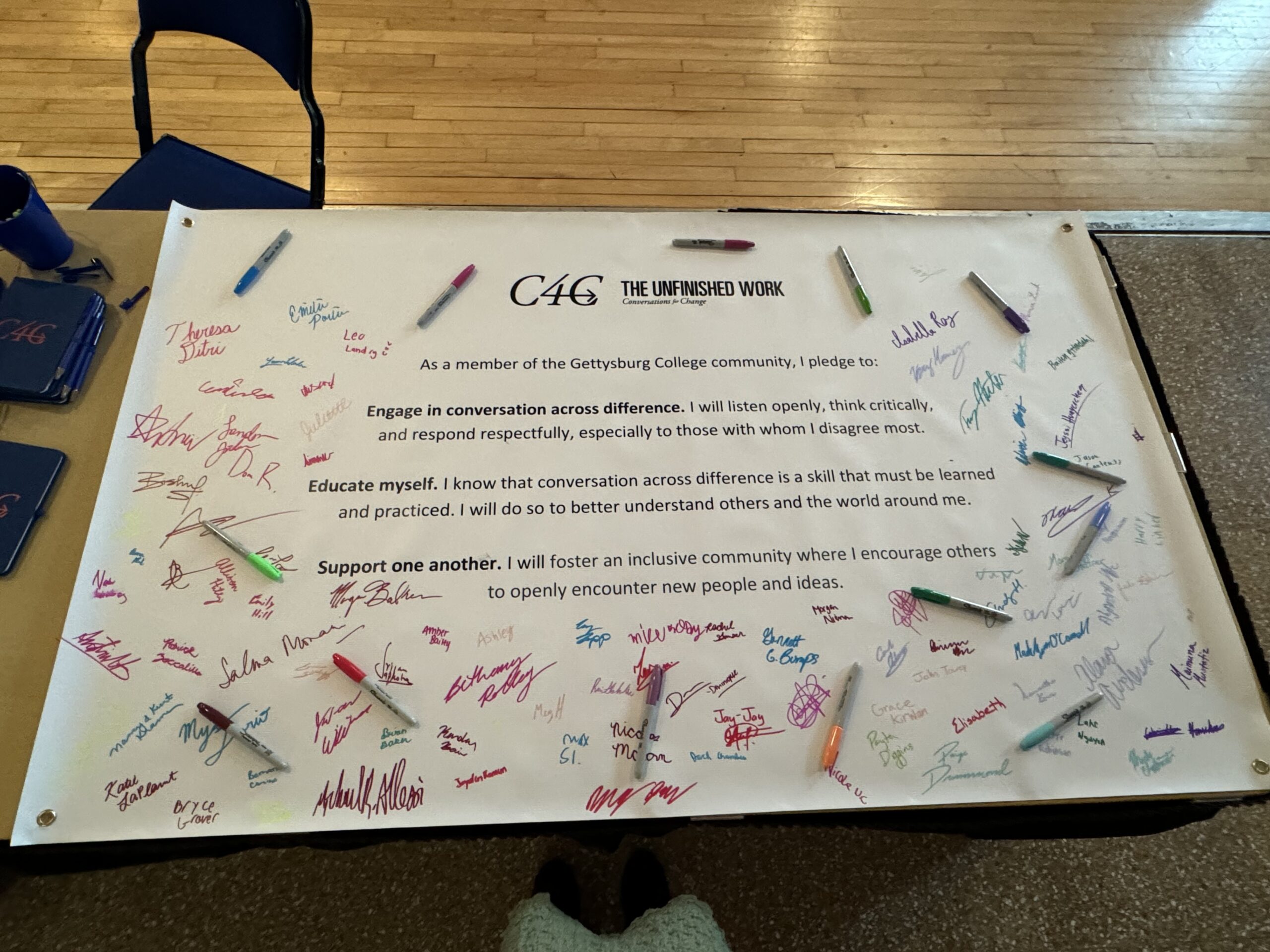
Gettysburg College Full Speech Transcript
Thank you, President Iuliano. I’m thrilled to be here.
Welcome to your first day of the school year at Gettysburg College!
How’s everyone feeling about starting the school year? Excited? Nervous? A little bit of both?
As hard as it may seem, I actually know how you feel. Just 3 days, 2 hours and 45 minutes ago, I dropped my only child Annie off at school for her first day at college, and it was a whirlwind of emotions for both of us. Especially for the Dad!
Starting something new can be a mix of thrilling and daunting, right? The same is true for us parents, and I can speak on behalf of all of them when I say that we’re immensely proud of you.
I can also speak on behalf of all of your parents when I tell you to please, please, please eat some vegetables and make sure to call home once in a while. Texts are not enough!
I’ve been asked to speak this evening because I’m here to help kick off something pretty amazing at Gettysburg College called Conversations for Change. This initiative is all about a special skill that’ll be super helpful in all parts of your life—college, your future job, and beyond. And by the end of tonight, I want you to feel excited to start using this skill.
So, what is it?
Quick show of hands: Who’s heard of civil discourse before? Great! Now, keep your hand up if you really know what it means. Okay, you can put your hands down.
Before I reveal my answer about what civil discourse means, I’d like to share examples of what happens when civil discourse works. You see, we actually see the outcomes of productive civil discourse all around us, if we’re paying attention. Because countless local town hall meetings, school board referendums, and state budgets are the product significant engagement by people of very different views, engaging in debate-and-compromise which eventually leads to community decisions. It’s everywhere!
It can also happen across political and ideological lines because there’s often overlap to be found. At the federal level, one recent example is The First Step Act, a bipartisan criminal justice bill signed by President Donald Trump in December 2018. The Bill enacted several changes in U.S. federal criminal law aimed at reforming federal prisons and sentencing laws in order to reduce recidivism, decreasing the federal inmate population, and maintaining public safety. [“The First Step Act of 2018: An Overview” (PDF). Congressional Research Service. March 4, 2019. Archived from the original on February 14, 2021.]
It was a significant first step to re-direct the course of federal incarceration and has led to thousands of federal prisoners being released. This bill was able to pass because of significant advocacy from a truly unlikely alliance, each motivated by different but overlapping needs: The Ford Foundation, the Charles Koch Foundation and President Trump’s son-in-law Jared Kushner. I imagine that most people would take a pause with at least one of these people – a leading progressive foundation, a leading libertarian foundation and President Trump’s son-in-law. These are people with very different backgrounds, ideologies, and value priorities, who came together to work through their interests and issues to craft an approach – with time, lots of listening and negotiations with legislators – that was a step forward for society. Now, you don’t need to agree on much, but if you can find places of agreement and compromise…much can be started.
A second example: the development of the Covid vaccines. You see, science research requires open inquiry, curiosity, intellectual humility and the free flow of information. Not all scientists have the same point of view – they may not see eye-to-eye – so this type of community is critical. Without it, we would have never come up with the mRNA vaccination approach decades ago, nor would we have moved as quickly to develop the correct antibodies when Covid showed up. Scientists debated which ideas might work, developed multiple hypotheses, shared what they learned from testing and continued debating and testing and learning…until we had a few solutions. Discourse of this type literally saved millions of lives.
So, those are two examples of what happens when civil discourse works – the WHY of civil discourse. But, WHAT is civil discourse?
Let me break it down for you. Civil discourse is about having respectful conversations about issues of public concern—even when we disagree. Let me say it again. Civil discourse is about having respectful conversations about issues of public concern—even when we disagree. And, I would add, particularly when we disagree…
What do I mean by issues of public concern? These are the big, thorny topics that can be tough to talk about. The Israel-Hamas War. Climate Change. Gender Identity. Education. Crime and policing. Reproductive health.
They can also be local issues that require public decision-making. School Budgets. Local Taxes. Housing Developments. Allocation of practice time to the local ballfields…or the ice rink.
The goal of civil discourse is to understand each other. Eventually, this understanding leads to more trust and the desire to stay “in community”, to learn together, to work together, and to live together. A representative democracy presupposes that its members will be able to discuss challenging issues with the goal of resolving them.
Raise your hand if you’ve found yourself in a tough conversation with a friend or family member about any of these issues.
Keep your hand raised if you wish you had the skills to have these tough conversations more productively. Okay, you can put your hands down.
The upcoming November election is one that’s really important to me right now. And let me tell you, a number of my younger colleagues and I don’t see eye-to-eye on it. They are unhappy that neither party leader has engaged deeply on climate change and the Middle East conflagration – so much so that they’re not sure that they’ll vote in the presidential race. “Why should I vote for either candidate if they are not taking a stand on the issues of the day?”, they argue. Here, I understand their concern. My question to them is “How does opting out of voting for a president accomplish what you are seeking?”
Their answer? “My vote is an affirmative choice for the person to lead our nation. If I don’t believe that the candidates are taking my issues seriously, I don’t want to vote for them and signal that I’m supportive of their platform.” After further clarifying questions to understand their motivations, I share my perspective, which is “in a two-party system, we are extremely unlikely to get candidates whose views completely align with our own values. The question is about who does so more.”
As you can see from this shortened example, civil discourse isn’t about winning the argument or being politically correct. It’s about understanding each other and learning together. Civil discourse is about having respectful conversations about issues of public concern—even when we disagree. This engagement will be critical to maintaining understanding and learning other’s views.
Learning and practicing civil discourse will be a game-changer for your college experience and beyond. It will help you understand different perspectives and build stronger relationships. It may even lead to you changing your views in some moments!
Plus, it’s essential for a healthy democracy.
Let me share a few stories of the value of civil discourse, for a nation, for a policy and for interactions with people with whom you don’t agree.
Let’s start with Nelson Mandela. Who here has heard of him?
Nelson Mandela spent 27 years in prison under apartheid, a brutal system of political, economic and geographic segregation by race in South Africa. During his time in prison, Mandela became an international icon and galvanized a global movement to topple this unjust system. When he got out, however, he didn’t seek revenge. Instead, he pushed for reconciliation and unity, even though it would have been easy for a nation of 33 million non-whites to have brought violence on the 5 million white people in South Africa.
He was elected president in 1994 as a result of the first multi-racial national election. In 1996, he started the Truth and Reconciliation Commission to help people have respectful conversations about past injustices – both victims of gross human rights violations and perpetrators of violence gave testimony over the next two years to the commission, some of which were public hearings and most of which was released in a national report. Mandela himself personally engaged in civil discourse with those who had once been his adversaries. And guess what?
Mandela’s approach of civil discourse helped heal a nation as it moved from a white government to a multi-racial government. Mandela’s efforts were so impactful that in 1993 – even before he was elected president, he was awarded the Nobel Peace Prize alongside then-South African President F.W. de Klerk.
Now, let’s talk about something closer to home. Ever heard of the Bipartisan Infrastructure Law? Sounds boring, right? But it’s actually super important.
Think about what your daily routine will look like this semester—heading to class, working at a part-time job, or catching up on an assignment at a downtown cafe. Now imagine dealing with outdated public transit, roads full of potholes, crumbling sidewalks, or unreliable internet that crashes while writing your paper. The 2021 Bipartisan Infrastructure Bill aims to fix these issues.
What does this have to do with civil discourse? Lawmakers from different parties had to work together to pass this bill, to negotiate its size, to focus where its funds needed to go and to identify how these funds needed to be raised. Through civil discourse, they made it happen, benefiting everyday Americans like you. And, they did it during a divisive moment of political party battles when very little was happening in either the Senate or the House.
But, civil discourse is not just a skill for politicians.
Let me tell you about Daryl Davis, a Black musician who took an unconventional approach to combating racism in America.
At a very young age, Daryl remembers wondering “how can you hate me…when you don’t even know me?”
After college, he was a member of a band that played in a bar that attracted members of the Ku Klux Klan. He reached out to those members and engaged them in respectful conversations. Instead of confronting them with hostility, Davis approached them with curiosity and an open mind.
Think about that for a moment. A Black man spending time with members of the KKK. If you don’t believe me, Google the news pieces that show him at KKK rallies. He listened to them and connected with them. Once people feel they are being listened to, he says, it’s easier to plant a seed of doubt.
Over the years, guess how many KKK members he was able to convince to change their minds through respectful conversations? How many people do you think he convinced to turn in their robes? Shout out a number. Not 10, 50, or even 100. He says that more than 200 turned in their robes, including a grand dragon of the KKK.
Over 200!
Adam Grant, an organizational psychologist states that “Daryl Davis demonstrates that talking face-to-face with your ideological opponents can motivate them to rethink their views. He’s an extraordinary example of what psychologists have repeatedly shown with evidence: In over 500 studies, interacting face-to-face with an out-group reduced prejudice 94 percent of the time.”
Okay, I know what you might be thinking. I’m not Nelson Mandela. Or Daryl Davis. Or a politician. Yeah, neither am I.
Let me share an example of how civil discourse will help you succeed in your career after you leave Gettysburg – an example from my own life.
Early in my career, a business partner and I decided to open a boarding school for students from an under-resourced community in Washington, DC. Eric and I called our schools the SEED School. This wasn’t your typical boarding school; students lived with us during the week and went home on weekends to stay connected with their families. My business partner Eric and I shared the same core values, but we didn’t always see eye-to-eye on issues of public concern, like the education system in America. You might be surprised to hear that. How could we be business partners and not agree on education issues? Here’s why.
Unlike what you might see on social media or in the news, most issues aren’t clear binary issues, not just “pro” vs. “against.” In fact, most issues have a lot of grey area in the middle. Eric and I acknowledged that, but we also knew that needed to figure out a method to come to agreement when we disagreed. After all, we were equal partners who had co-founded this non-profit. So, what did we come up with?
Simple. We agreed that we would discuss and debate the issue until we understood the different views – then we would try to land on the best position for the organization.
Sometimes, this took a few minutes of conversation. In other instances, a few hours. A few times, it went overnight…or as long as necessary. We had committed to “stay in community”, that is, lead our organization, and to the understand-and-debate approaches to get to the best place for our organization.
We did this so often, and in full visibility of our colleagues, that we made it into a core operating value for the organization: we called it “arguing joyfully”. In actuality, it was civil discourse.
“Arguing joyfully” strengthened our relationship and strengthened our work together. But, it did more: it became a hiring and retention advantage for the organization. People liked to work in an organization that where their views were acknowledged, understood and part of the input to decision-making. We liked to hire people who would bring diverse views to the work. And, they all committed to engaging in civil discourse to come to the best answers for the community.
The SEED Schools grew and expanded across Washington, DC; Baltimore and Miami. And, we attracted and retained some of the best colleagues in the business. But, we weren’t the only organization who understood the power of civil discourse in the workplace. That concept has taken root everywhere: in fact, 86 percent of employers say that learning to engage across difference is essential preparation for the workforce, according to the most recent employer survey from the American Association of Colleges and Universities. 86 percent! So, this is skill is essential for work today.
I’ve shared the WHY of civil discourse and the WHAT, so it’s now time to talk a bit about the HOW.
You’ll find yourself in many conversations around difficult topics of public concern this year. With your roommate. A classmate. A professor. Your parents.
So, how do you “do” civil discourse? There isn’t a one-size-fits-all approach. Civil discourse with your roommate will look different than it might in a classroom setting. The good news is your school has launched the Conversations for Change initiative to give you time to practice this year. Over time, you’ll get better at it. And, your “civil discourse muscle” will grow stronger.
Here’s one simple way to think about the approach:
Imagine you and your college roommate are discussing the Israel-Hamas war.
After your roommate shares her point of view, you “Pause and Paraphrase.” Essentially, you take a minute to process what she said, and then repeat back what you heard to show you are listening with respect.
Next, “Ask Curious Questions.” These aren’t gotcha questions. Instead, they are meant to gain an understanding.
Then, “Share Your View.” When it’s your turn, tell her your point of view. Perhaps through a personal experience you’ve had.
Repeat these steps until you both agree to conclude the conversation. Remember, the goal is to build a shared understanding, not to win or change someone’s mind—though that may happen.
Sound easy? It’s actually not! Here’s why:
First, this whole approach requires being open-minded – what academics would call “intellectual humility” – that’s not so easy these days. We all have positions and words that spark visceral, emotional responses. That’s normal. We also have personal positions that we hold sacrosanct and deeply important to us. Yet, others may have differing views. That’s also normal. Yet, this discourse requires that we hold those reactions while we practice respect, curiosity, empathy and perspective-taking. That’s hard!
Second, you need create the social permission for you and your classmates to practice this approach. Gettysburg College has taken the first, critical step with Conversations for Change. That’s the institutional permission. Now, you and your classmates need to give each other the permission to practice this. That requires respect and empathy, too!
Even given these challenges, I hope that this sounds like something that you will try. Can I trust that you will?
Great! This skill will enhance your interactions with friends, roommates, classmates, and family, and it will be invaluable in your professional life and in any community you engage with throughout your life.
In a bit, I’ll be joined by two of your classmates, and we’ll show you how this works in action.
A thought about language: you might be uncomfortable with the term “civil” because of one of its definitions of being “polite”. Let me share this quote from Archon Fung, a professor at the Harvard Kennedy School who speaks on this very issue:
“It’s important to distinguish between two senses of civility. The first is a superficial kind of civility—being nice, refraining from insults. The second is a deeper, more important sense of civility that is about behaving in ways that are necessary for cooperative projects such as schools and democratic societies to work well.”
This second, deeper sense of civility is what we’re seeking.
If you’re still uncomfortable, use a synonym, such as “constructive dialogue”. In any case, make sure to engage in the process!
College is such a unique place. You are so lucky to be surrounded by people with incredibly different backgrounds and viewpoints. After college, you may not be surrounded by so many people with diverse perspectives. Make the most of this opportunity. Use this time to practice and build those skills. Think of it as a chance to contribute to a more inclusive and understanding community.
To close, I thought it would be fitting to mention Abraham Lincoln, who holds a special place in Gettysburg College’s legacy. I’m going to close with what I believe to be President Lincoln’s greatest speech. No, it’s not the Gettysburg Address, which is also a masterpiece. Even greater in my mind is the speech that he delivered only a month before he was assassinated, his Second Inaugural Address. This was a time of great division and polarization in our country. The end of the Civil War and of institutionalized slavery was days away.
In his speech, Lincoln urged the country to move forward with “malice toward none, with charity for all.” He challenged Americans to work together across differences to heal the nation’s wounds and to create and maintain a fair and lasting peace for all. He did not seek revenge, he sought understanding. He did not valorize victory – he asked for shared humility. He called for community and humanity, to “strive on to finish the work we are in, to bind up the nation’s wounds, to care for him who shall have borne the battle and for his widow and his orphan, to do all which may achieve and cherish a just and lasting peace among ourselves and with all nations.”
This call is still relevant today. Our unfinished business now is to embrace civil discourse to build a stronger country. We need to work together and to provide the permission for each other to learn civil discourse – to build our muscles here at Gettysburg College so that you’ll be able to use it when you leave – at work, in your communities and in our national policies.
I’ll say it one more time: Civil discourse is about having respectful conversations about issues of public concern—even when we disagree.
As you vote in the upcoming election and as you enter the public square, you will be the ones who will need to model the way, the ones whom I will rely on to make our community—and our country—a better place.
Thank you.
Stay Engaged
Get More News
Join our mailing list to get more news like this to your mailbox.
Support Our Work
Help us invest in the talent, ideas, and networks that will develop young people as effective, lifelong citizens.
Ways to Support Us